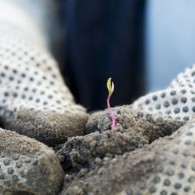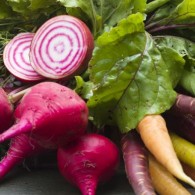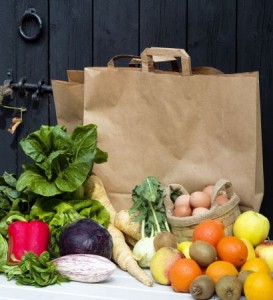You remember Lauren, right? Some months ago she started paying a bit more attention to the food she was eating. She found out more about our food system, like the concept of seasonality of fruits and vegetables or the way some food products travel half across the globe before landing on our plates. She also learned about alternatives, such as the group of students in Antwerpen who set up a system of vegetable bags, making sure she and others can enjoy their weekly portion of fresh, local, and organic products.
 Today, Lauren is in Mannheim. She’s been here for a couple of weeks already, taking part in an exchange project between her university in Antwerp and the one here. The beer may not be as good as back home, but there’s so much to do she has hardly time to think about that.
Today, Lauren is in Mannheim. She’s been here for a couple of weeks already, taking part in an exchange project between her university in Antwerp and the one here. The beer may not be as good as back home, but there’s so much to do she has hardly time to think about that.
One of the first days she was in Mannheim for example, a big event took place at the university, with hundreds of students from all over Europe coming together. Being new to the city, she went to have a look, and ended up sitting in a workshop on exactly the same thing she had left behind in Antwerpen: vegetable bags. How nice to meet so many young people sharing her concerns.
After an open discussion on the characteristics of our food system and the choices one can usually make when shopping for groceries, the group was divided into different teams to brainstorm about the different parts of the process of setting up a vegetable bag system. Lauren really enjoyed being able to share some of the things she already knew during the discussion, but the brainstorming turned out to be quite difficult, and raised a lot of questions.
 How do you select the producers you want to work together with? How do you organise your logistics in a simple and efficient way? How do you reach your future consumers? And what are some other activities you can offer them? Luckily the facilitator of the workshop had done some research as well, interviewing people who had already developed their own systems, and could give feedback on the results of their brainstorming.
How do you select the producers you want to work together with? How do you organise your logistics in a simple and efficient way? How do you reach your future consumers? And what are some other activities you can offer them? Luckily the facilitator of the workshop had done some research as well, interviewing people who had already developed their own systems, and could give feedback on the results of their brainstorming.
Lauren left the workshop with her head buzzing with new ideas, and the contacts of one of the local students. A couple of days later, she’s starting to settle into her life in Mannheim, and she’s already missing her fresh vegetables from back home. She can’t find a local initiative, so she decides to call up the girl from the workshop. Maybe they could start one themselves?
 Taking their notes from the workshop and using her earlier experience as a customer in Antwerpen, they begin to work out the basics. Finding producers in a short radius to the city and visiting them to get to know them. Securing support from the university to help fund the programme and having an easily reachable location. Researching the tastes and expectations of their future customers. Recruiting volunteers to hand out the packages and collect the money. Develop promotion materials and think of a strategy to reach people.
Taking their notes from the workshop and using her earlier experience as a customer in Antwerpen, they begin to work out the basics. Finding producers in a short radius to the city and visiting them to get to know them. Securing support from the university to help fund the programme and having an easily reachable location. Researching the tastes and expectations of their future customers. Recruiting volunteers to hand out the packages and collect the money. Develop promotion materials and think of a strategy to reach people.
That night Lauren is heading to a bar in the centre of town with her new friend, ready for her first AEGEE meeting. They have solved most of the questions and know what to pay attention to. Going over the results of their search, they feel they are ready to present their idea to the other members. But will they like it?
From here on the story is yours. If this is the first time you hear about vegetable bags, find out more here. Or maybe you already heard about it in your own city? Tell us all about your experience so we share it with others. And if you would be interested in starting one yourself, let us know and we can support you with more tips! For all information: enwg.aegee@gmail.com
Written by Mathieu Soete, Policy Officer on Sustainability

